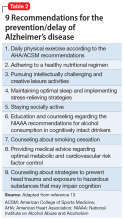1. Mehta D, Jackson R, Paul G, et al. Why do trials for Alzheimer’s disease drugs keep failing? A discontinued drug perspective for 2010-2015. Expert Opin Investig Drugs. 2017;26(6):735-739.www.cdc.gov/physicalactivity/basics/older_adults/index.htm . Updated November 12, 2018. Accessed December 18, 2018.https://www.niaaa.nih.gov/alcohol-health/overview-alcohol-consumption/moderate-binge-drinking . Accessed December 9, 2017.https://www.niaaa.nih.gov/alcohol-health/overview-alcohol-consumption/what-standard-drink . Accessed November 9, 2017.https://clinicaltrials.gov/ct2/show/NCT03688126?term=pointer&cond=Alzheimer+Disease&rank=1 . Published September 28, 2018. Accessed November 3, 2018.

